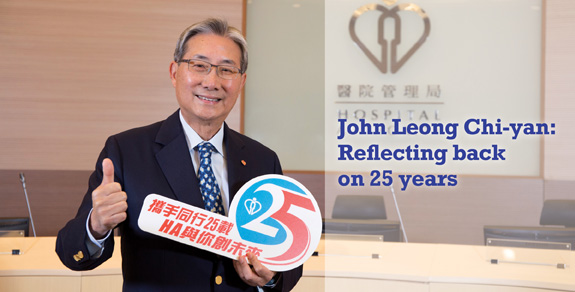
Professor Leong says a pragmatic management style, calm approach and ‘can-do’ attitude will help ensure that all the initiatives under the Action Plan developed in response to HA Review are successfully implemented.
John Leong Chi-yan: Reflecting back on 25 years
Hospital Authority (HA) Chairman Professor John Leong Chi-yan is more qualified than most to reflect on HA’s development during the past quarter of a century. He began his association with the Authority on its establishment in 1990 as a first-term HA Board Member, and has maintained an active involvement in its evolution over the years, culminating in his re-appointment as HA Chairman for another two years following his first stewardship in December 2013. As HA embarks on a year-long celebration of its 25th anniversary, Professor Leong shares his feelings about watching HA grow and tackling future challenges in working to uphold the Authority’s mission of ‘Helping People Stay Healthy’ in Hong Kong.
“The demand for public healthcare services is continually increasing,” says Professor Leong. “In trying to meet this ongoing challenge with limited resources, it is vital that all of us at HA keep an open mind in the search for effective solutions. The adoption of new service models, enhancing the clinical skills of healthcare workers, leveraging new technology – these are just a few of the ways in which we may expand and strengthen our service capabilities.”
Professor Leong notes that there were only four new public hospitals (North District Hospital, Pamela Youde Nethersole Eastern Hospital, North Lantau Hospital and Tseung Kwan O Hospital) came into service since HA’s establishment in 1990, with two more (Tin Shui Wai Hospital and Hong Kong Children’s Hospital) coming on stream in one or two years. “The expansion in the number of patient beds cannot keep up with the increase in demand,” he says. “If, for example, we can leverage technology to conduct more minimally invasive surgeries, we can reduce the length of inpatient stays for many procedures. In hospital constructions or redevelopment, building rehabilitation blocks next to acute inpatient wards would allow for the prompt transfer of stable patients to rehabilitation facilities, thus reducing the pressure on acute wards.”
Professor Leong explains that while the demand for public healthcare services is growing, HA still handles close to 90% of inpatient healthcare needs in Hong Kong with a budget that is equivalent to just 2.5% of the city’s GDP, adding that all HA colleagues should be “very proud of this achievement”.
But he emphasises that for HA to maintain its status as a leading public healthcare provider and continue to deliver world-class medical services, there is always room to improve and the Authority must never stand still. His more immediate future plans include strengthening specialist training for young doctors and encouraging more experienced doctors to continue undertaking professional training. He also encourages clinicians to obtain credentialing on the use of new procedures particularly new medical technologies. Efforts will also be focused on strengthening clinical research and innovation. “The data collected through our excellent Clinical Management System, which was developed by our in-house IT team, is supporting our daily clinical works, as well as our efforts to make advances through clinical research,” he says.
On a broader level, he regards the implementation of the more than 100 actions in three years contained in the Action Plan drawn up in response to the Government’s Report of the Steering Committee on Review of Hospital Authority as among the vital current missions for HA.
“The establishment of HA was a major milestone in the provision of public healthcare services in Hong Kong. It is relatively rare to have a statutory body take over the management of all public hospitals and institutions from the Government and subvented organisations,” says Professor Leong. “While this has been a great responsibility, our size and relative autonomy have proved advantageous in developing our services. Combined with the dedication and professionalism of my colleagues, I am confident that HA will continue to successfully deal with new challenges and to provide outstanding healthcare services to the people of Hong Kong.”






